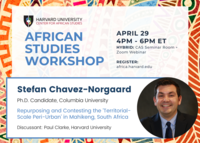Date:
Location:

The African Studies Workshop at Harvard continues this year with a new and exciting schedule of presenters. The presenters' papers explore Africa’s changing place in the world - and the new economies, legalities, socialities, and cultural forms that have arisen there. We shall also interrogate the claim that the African present is a foreshadowing of processes beginning to occur elsewhere across the globe; that, therefore, it is a productive source of theory and analysis about current conditions worldwide. At each workshop, a scholar presents a paper on one facet of the rapidly changing position of Africa in the global political economy and the impact of that change on global distributions of wealth, well-being, and power. Then a discussant provides commentary followed by an open discussion, in which students are given the floor first, followed by anyone else in attendance. Workshop presenters are scholars of high international repute as well as up-and-coming Africanist intellectuals.
Join us on April 29th from 4-6 pm for the Spring 2024 African Studies Workshop with Stefan Chavez-Norgaard presenting: Repurposing and Contesting the ‘Territorial-Scale Peri-Urban’ in Mahikeng, South Africa
Discussant: Paul Clarke, Harvard University
Abstract: This paper looks territorially at present-day Mahikeng, South Africa in relationship to Johannesburg and Pretoria, finding longstanding patterns of peripheralization and dependency that are dynamic, contested, and ongoing. That contestation is expressed in part through residents’ repurposing of apartheid-era built sites. Mahikeng was a receiving site of apartheid-era “displaced urbanization” (Mosiane and Götz, 2022) as part of Mmabatho, pre-planned capital of the Bophuthatswana ‘Bantustan.’ South African ‘Bantustans’ were created in the 1960s and 1970s through forced relocation and dispossession to ‘Native lands,’ and illegitimately declared self-governing entities or ‘independent republics’ until the end of apartheid. In contrast to scholarship framing these spaces mainly as ‘dumping grounds,’ I seek to humanize enclaves of dispossession as sites of city living by exploring repurposings. I define “repurposings” as actions to transform urban space in accordance with visions or vernacular uses of space other than those originally anticipated by professional planners. Ordinary South African residents leverage changing planning processes when repurposing. What emerges are heterogenous aesthetic and symbolic forms of “displaced urbanism” (Mosiane and Götz, 2022). Focusing on institutional and relational planning in Mahikeng, I ask: how and why do residents repurpose space? With what consequences? Methods include archival research, semi-structured interviews, and in situ analyses of built structures. I find that across institutional moments, Mahikeng’s built form is informed by relationships with sites of surplus accumulation. Residents’ reappropriations of apartheid-era spaces are themselves ‘classed’ and divergent phenomena, and are culturally and socioeconomically grounded, revealing multiple ambiguous meanings to ‘territorial-scale peri-urban’ spaces today.
Stefan Chavez-Norgaard is a PhD Candidate in Urban Planning at Columbia University’s Graduate School of Architecture, Planning, and Preservation (GSAPP). For the 2023–2024 academic year, Stefan is an in-resident scholar at the Lincoln Institute of Land Policy, supporting the Institute’s work in Africa, and a Democracy Visiting Fellow at the Harvard Kennedy School’s Ash Center. Stefan’s research interests include urban and planning theory, local-government and planning law, and mixed-methods research focused on planning practice and urban governance in the related but distinct late-liberal contexts of South Africa and the United States. Stefan is passionate about participatory democracy and how cities’ public/private arrangements affect equitable and sustainable urban development. His dissertation examines areas of apartheid-era forced relocation in South Africa and how master plans have been implemented and repurposed in these geographies by residents and planners.
